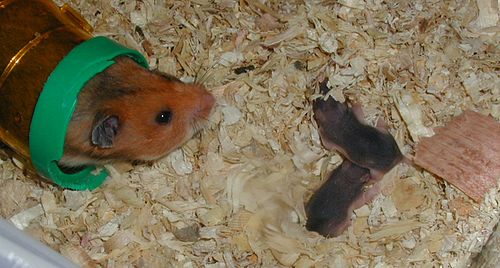Ratnoun
(zoology) A medium-sized rodent belonging to the genus Rattus.
Ratnoun
(informal) A term indiscriminately applied to numerous members of several rodent families (e.g. voles and mice) having bodies longer than about 12 cm, or 5 inches.
Ratnoun
(informal) A person who is known for betrayal; a scoundrel; a quisling.
Ratnoun
(informal) An informant or snitch.
Ratnoun
(slang) A person who routinely spends time at a particular location.
Ratnoun
Scab.
Ratnoun
Vagina.
Ratnoun
A wad of shed hair used as part of a hairstyle.
Ratnoun
(regional) A scratch or a score.
Ratnoun
A place in the sea with rapid currents and crags where a ship is likely to be torn apart in stormy weather.
Ratverb
(usually with “on” or “out”) To betray someone and tell their secret to an authority or an enemy; to turn someone in, bewray.
Ratverb
(of a dog, etc.) To kill rats.
Ratverb
(regional) To scratch or score.
Ratverb
To tear, rip, rend.
Ratnoun
One of several species of small rodents of the genus Rattus (formerly included in Mus) and allied genera, of the family Muridae, distinguished from mice primarily by being larger. They infest houses, stores, and ships, especially the Norway rat, also called brown rat, (Rattus norvegicus formerly Mus decumanus), the black rat (Rattus rattus formerly Mus rattus), and the roof rat (formerly Mus Alexandrinus, now included in Rattus rattus). These were introduced into America from the Old World. The white rat used most commonly in laboratories is primarily a strain derived from Rattus rattus.
Ratnoun
A round and tapering mass of hair, or similar material, used by women to support the puffs and rolls of their natural hair.
Ratnoun
One who deserts his party or associates; hence, in the trades, one who works for lower wages than those prescribed by a trades union.
Ratverb
In English politics, to desert one's party from interested motives; to forsake one's associates for one's own advantage; in the trades, to work for less wages, or on other conditions, than those established by a trades union.
Ratverb
To catch or kill rats.
Ratverb
To be an informer (against an associate); to inform (on an associate); to squeal; - used commonly in the phrase to rat on.
Ratnoun
any of various long-tailed rodents similar to but larger than a mouse
Ratnoun
someone who works (or provides workers) during a strike
Ratnoun
a person who is deemed to be despicable or contemptible;
Ratnoun
one who reveals confidential information in return for money
Ratnoun
a pad (usually made of hair) worn as part of a woman's coiffure
Ratverb
desert one's party or group of friends, for example, for one's personal advantage
Ratverb
employ scabs or strike breakers in
Ratverb
take the place of work of someone on strike
Ratverb
give (hair) the appearance of being fuller by using a rat
Ratverb
catch rats, especially with dogs
Ratverb
give away information about somebody;
Ratnoun
a rodent that resembles a large mouse, typically having a pointed snout and a long tail. Some kinds have become cosmopolitan and are sometimes responsible for transmitting diseases.
Ratnoun
a despicable person, especially a man who has been deceitful or disloyal
Ratnoun
an informer
Ratnoun
a person who is associated with or frequents a specified place
Ratnoun
a pad used to give shape and fullness to a woman's hair.
Ratinterjection
used to express mild annoyance or irritation.
Ratverb
hunt or kill rats
Ratverb
desert one's party, side, or cause
Ratverb
shape (hair) with a rat.
Rat
Rats are various medium-sized, long-tailed rodents. Species of rats are found throughout the order Rodentia, but stereotypical rats are found in the genus Rattus.
Hamsternoun
Any of various Old-World rodent species belonging to the subfamily Cricetinae.
Hamsternoun
especially, the golden hamster, Mesocricetus auratus, and the dwarf hamsters of genus Phodopus, often kept as a pets and used in scientific research.
Hamsternoun
Other rodents of similar appearance, such as the maned hamster or crested hamster, Lophiomys imhausi, mouse-like hamsters of genus Calomyscus, and the white-tailed rat (Mystromys albicaudatus).
Hamsternoun
A small European rodent (Cricetus frumentarius). It is remarkable for having a pouch on each side of the jaw, under the skin, and for its migrations. Hamsters are commonly kept as a pets.
Hamsternoun
short-tailed Old World burrowing rodent with large cheek pouches
Hamster
Hamsters are rodents (order Rodentia) belonging to the subfamily Cricetinae, which contains 19 species classified in seven genera. They have become established as popular small pets.




























